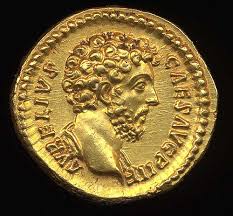Marcus Aurelius
Born April 26, 121, into a prominent Roman family with strong political ties, Marcus Aurelius Antoninus Augustus is one of the most decent and dignified leaders in human history. Best known in his role as Roman Emperor, he was foremost a student of stoic philosophy with Epictetus as his role model.
His parents died when he was young. He was three when his father died but said he was influenced from what he learned about the man. He did not attend school (of which he is grateful) but had tutors. Diognetus, a painting teacher and free thinker, introduced him to philosophy. For a while Marcus wore corse habits and slept on the floor, and though it did not last long he kept to the philosophers' views of a simple lifestyle.
Emperor Hadrian took notice of the intelligent, serious teenager and when his previous choice for a replacement to the throne died he adopted Pius Antoninus and convinced him to adopt Marcus Aurelius as well as Lucius Verus, the son of his deceased successor. Hadrian died July 10,138 and Pius Antoninus replaced him.
Through his adopted father Marcus learned the ways of politics and government affairs. At nineteen he became leader of the senate (consul) and a strong backup for Antoninus. He studied law and continued his philosophical quest. He married Faustina and had several children.
Emperor Antoninus died in 161 and though it was clear enough Marcus Aurelius was the choice to become next in line he insisted on a joint rule with his adopted brother Verus. The brothers’ reign was a constant struggle to keep the Roman territories intact starting with the Parthians in the East. One of their generals, Avidius Cassius, was made governor of Syria and soldiers returning from that country brought with them a virus that killed a large part of the Roman population. From the north the brothers were faced with the serious and growing threat of barbarian tribes. Verus died in one of these conflicts, and Marcus was on his own.
There were rumors Marcus was near death and Avidius Cassius claimed the title of emperor. Marcus exiled to the East but not for long as Cassius was killed by his own soldiers. Marcus traveled the eastern provinces with his wife, where she died. He made is son Commodus co-ruler. Father and son spent most their time fighting the Germanic tribes. Marcus Aurelius Antoninus Augustus died March 17, 180.
Quotes from "Meditations"
“You have power over your mind - not outside events. Realize this, and you will find strength.”
“Everything we hear is an opinion, not a fact. Everything we see is a perspective, not the truth.”
“The best revenge is to be unlike him who performed the injury.”
“Very little is needed to make a happy life; it is all within yourself in your way of thinking.”
“Reject your sense of injury and the injury itself disappears.”
“The first rule is to keep an untroubled spirit. The second is to look things in the face and know them for what they are.”
“How much more grievous are the consequences of anger than the causes of it.”
“Never let the future disturb you. You will meet it, if you have to, with the same weapons of reason which today arm you against the present.”
“Here is a rule to remember in future, when anything tempts you to feel bitter: not "This is misfortune," but "To bear this worthily is good fortune.”
“Never esteem anything as of advantage to you that will make you break your word or lose your self-respect.”
“Whoever does wrong, wrongs himself; whoever does injustice, does it to himself, making himself evil.”
“Do every act of your life as though it were the very last act of your life.”
“Just that you do the right thing. The rest doesn't matter. Cold or warm. Tired or well-rested. Despised or honored. Dying...or busy with other assignments. Because dying, too, is one of our assignments in life. There as well: "To do what needs doing." Look inward. Don't let the true nature of anything elude you. Before long, all existing things will be transformed, to rise like smoke (assuming all things become one), or be dispersed in fragments...to move from one unselfish act to another with God in mind. Only there, delight and stillness...when jarred, unavoidably, by circumstances, revert at once to yourself, and don't lose the rhythm more than you can help. You'll have a better grasp of the harmony if you keep going back to it.”
